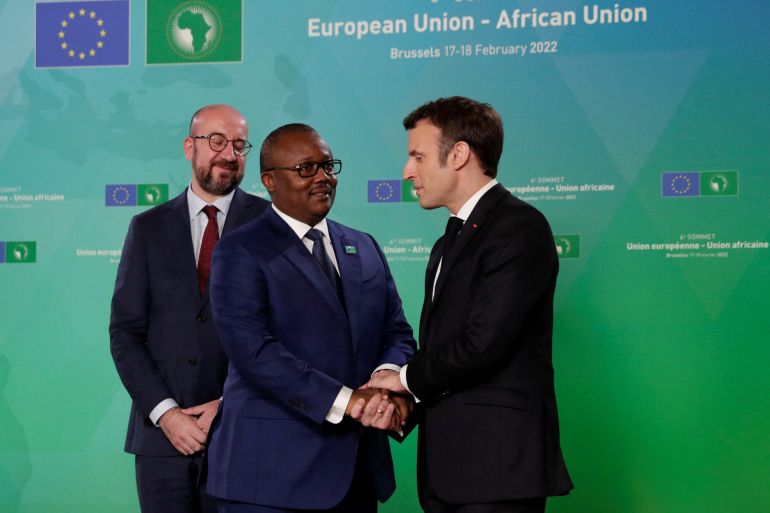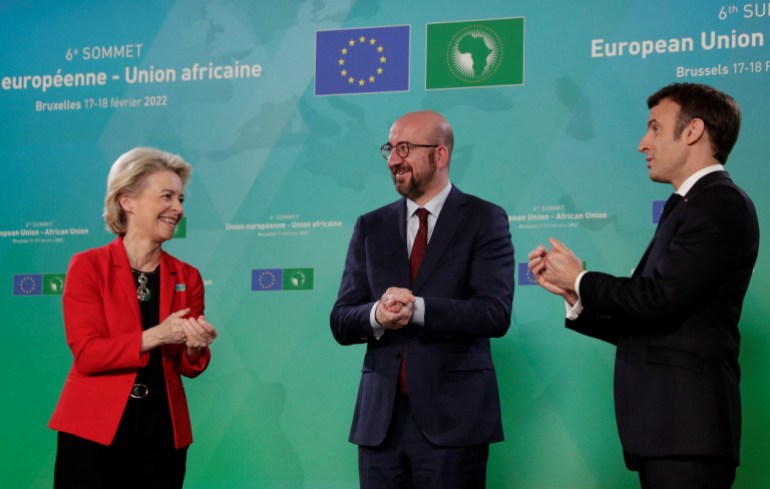EU launches reset with AU after pandemic disruption
The European Union will offer several packages of support at the summit to bolster health, education and stability in Africa.

The European Union has welcomed more than 40 African leaders to Brussels in an effort to reassert its influence on a continent where China and Russia have made hefty investment inroads, and where many felt let down by Europe’s COVID-19 vaccines rollout.
The EU will offer several packages of support at the EU-AU summit to bolster health, education and stability in Africa, and will pledge half of a new 300 billion euros ($340.9bn) investment drive launched to rival China’s Belt and Road Initiative.
Keep reading
list of 4 itemsGeorgia’s ‘foreign agents’ bill: What’s the controversy about? What’s next?
What’s at stake in next month’s European elections?
EU to drop rule-of-law dispute with Poland
But the meeting also takes place just as France and its allies fighting armed groups in Mali said on Thursday they would begin their military withdrawal from the country.
“We are not here to carry on business as usual,” European Council chief Charles Michel said.

Senegal’s President Macky Sall, who currently chairs the African Union, said it was a “fresh start for a renewed partnership”.
Alex Vines, the Africa director at Chatham House, told Al Jazeera European countries “really do want to change the relationship”.
“European leaders have understood that Africa is a neighbouring continent and that they need to change the relationship and bring it closer back to Europe. They feel the heat of competition … as the Chinese and others are very involved now for the last couple of decades in the African continent,” he said from London.
“There was a China summit earlier this year … there is Russia Africa Summit this year and President Biden has indicated he’s going to have a second Africa-US leaders Summit this year,” he added. “It’s crowded, and Europe is feeling the heat.”
Tensions over vaccines
European and other wealthy nations have been heavily criticised for hoarding protective equipment and vaccines during the pandemic, with some African leaders saying the slow pace of donations could lead to “vaccine apartheid”.
By the start of February, only 11 percent of Africans were fully vaccinated against the coronavirus – far fewer than in richer countries.
Sierra Leone President Julius Maada Bio challenged Europeans to remember there are “human beings on the other side” in Africa who have been left behind in the unequal global response to COVID-19, adding this has security implications.

There was also dismay over Europe’s travel bans on South Africa after the Omicron variant was detected there late last year.
South African President Cyril Ramaphosa said he and other African leaders would raise the issue of intellectual property rights for COVID vaccines and treatments. Many developing countries want these rights waived, but face opposition from rich nations, including many in the EU.
Tensions run deeper on other issues between two continents with colonial ties, including over migration flows and the erosion of democracy in several African countries, some of which have recently seen coups d’etat, including Mali.
The European Commission announced this week that the EU and the Gates Foundation would invest more than 100 million euros ($113.5m) in the next five years to help set up an African medicines regulator to boost the continent’s drugs and vaccine production.
The race to establish the African Medicines Agency (AMA) comes after the pandemic exposed the region’s dependence on imported vaccines.
Just more than 5 percent of medicines and 1 percent of vaccines consumed by Africa’s population of 1.2 billion people are produced locally.
Loans for healthcare
Separately, the European Investment Bank announced on Thursday it would make available 500 million euros ($568m) in cheap loans to African countries to strengthen healthcare systems.
That credit line is expected to mobilise a total of 1 billion euros ($1.1bn) in private and public investments, the bank said.
W Gyude Moore, a senior policy analyst at the Center for Global Development, welcomed the investment pledge and said he hoped it would start a partnership of true equals.
“But there is a long history of unfulfilled promises like this when it comes to the EU and Africa, so the African Union, while cautiously optimistic, will remain sceptical until this pledge is converted into projects on the ground.”